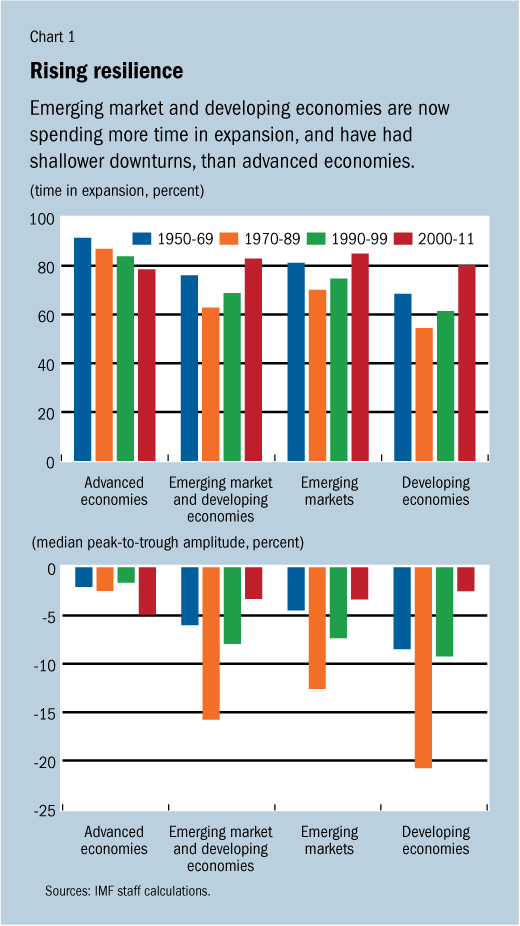
Typical street scene in Santa Ana, El Salvador. (Photo: iStock)
IMF Survey: Emerging, Developing Economies Now More Resilient
September 27, 2012
- Improved performance due to good policies, less frequent shocks
- Emerging, developing economies had longer expansions, smaller downturns
- Shocks can still derail expansions; so policy buffers must be rebuilt
Many emerging and developing economies did well over the past decade and through the global financial crisis. Analysis in the IMF's latest World Economic Outlook (WEO) suggests this resilience is likely to continue.

Auto plant in Bursa, Turkey, one of the emerging markets that can look forward to continued resilience thanks to strong policies (photo: Ed Kashi/VII/Corbis)
WORLD ECONOMY
Optimists have pointed to improved policymaking in these economies, and to their increased “policy space”—room to respond to shocks without undermining sustainability. But skeptics note that these economies’ recent good performance has been supported by factors that are prone to reversal, such as strong capital inflows, rapid credit growth, and high commodity prices.
The IMF study suggests some of the optimism is warranted. The chapter studied economic expansions and downturns in more than 100 emerging and developing economies over the past 60 years.
Steady gains
The researchers found that the resilience of emerging and developing economies is not a recent development, but the result of steady gains in performance over the past two decades. These economies are now spending more time in expansion, and their downturns and recoveries have become shallower and shorter (see Chart 1).

In fact, the past decade was the first time that emerging and developing economies spent more time in expansion, and had shallower downturns, than advanced economies. This was true not just for emerging markets, but for low-income countries as well.
The authors cautioned, however, that these economies are not immune to shocks, either external or domestic. “Among external shocks, recessions in advanced economies and ‘sudden stops’ in capital inflows have the most pronounced effects,” said Jaime Guajardo, one of the chapter’s authors. “These shocks double the likelihood that expansions in emerging and developing economies will come to an end. The effect of domestic shocks is just as strong, if not stronger—credit booms make it twice as likely that an expansion becomes a downturn by the following year, and banking crises make it three times as likely.”
So if shocks can easily derail expansions in emerging and developing economies, what accounts for their improved performance? Part of the improvement is because some of these shocks are less common now than in past decades, the researchers found. But the bulk of the improvement is due to better policies (see Chart 2).

“Many emerging and developing economies have become better at policymaking,” said Abdul Abiad, who headed the research team. “More of them have adopted inflation targeting and flexible exchange rates, for example, and their fiscal and monetary policies are now more ‘countercyclical’ than in the past—that is, they stimulate the economy when it is weak, and rein it in when it is overheating.”
The researchers found that these economies have built up more room to maneuver, thanks to lower inflation and better fiscal and external positions than in the past. “Better policies and greater policy space account for three-fifths of the increased duration of in these economies’ expansions,” said Abiad, “and less frequent shocks accounts for the remainder.”
‘Recoupling’ risk
But the report also cautions against complacency. “There are significant risks to the outlook for Europe and the United States,” said Guajardo. “If these risks materialize, emerging and developing economies will likely end up ‘recoupling’ with advanced economies, much as they did during the recent global crisis.” Even in the absence of external shocks, he noted, homegrown shocks could pull down growth further in some key emerging economies.
To guard against such risks, the researchers say these economies will need to rebuild their buffers, to ensure that they have adequate policy space. “In response to the global downturn, policy space was appropriately used—many countries increased spending and lowered interest rates to support activity,” Abiad said. “That policy space needs to be restored, by reducing fiscal deficits and keeping inflation in check. In addition, these economies will be more resilient to new shocks if improvements in their policy frameworks—including greater exchange rate flexibility and more countercyclical macroeconomic policies—are maintained.”







